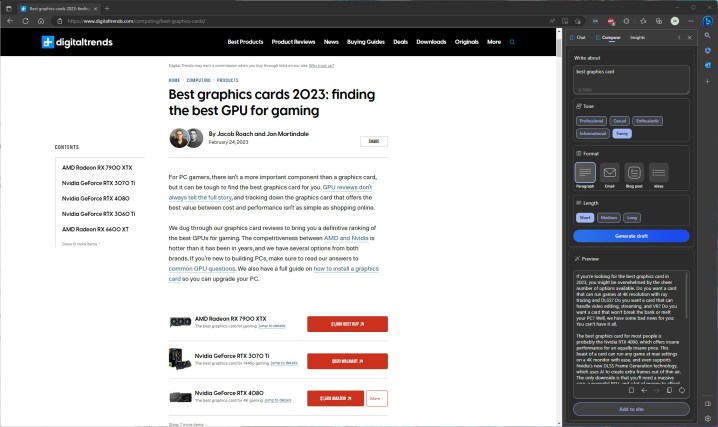Microsoft is finally making the version of Bing Chat we heard about in February a reality. The latest version of Microsoft Edge (111.0.1661.41) includes the Bing Copoilot sidebar, which allows you to chat, generate AI content, and get insights into topics powered by AI.
This is the form of Bing Chat Microsoft originally pitched. Since its launch, the chat portion of Bing Chat has been available through a waitlist that, according to Microsoft, has amassed millions of sign-ups. However, Microsoft also talked about Bing Copilot, which would live in the Edge sidebar and open up the possibility of generating emails, blog posts, and more, as well as provide context for whatever web page you were on.

The Compose tab is where you can generate emails, blog posts, and even lists of ideas. It offers several tones ranging from professional to funny, as well as three lengths and four formats. Enter your prompt, select your parameters, and generate your draft. It doesn’t seem like the length matters much, though; even with a Short length, the AI would spit out five or more paragraphs to most prompts I entered.
Once you’re done, you can regenerate the response to your prompt or copy it from the window. There’s also an Add to site button below the text window, but I wasn’t able to find a use for it.
The Insights tab is contextual, pulling insights from and around the website you’re currently on. For example, on the Digital Trends home page, it pulled some basic information about the website, where users are located, and how most visitors land on the website. It’s not clear where these analytics are coming from, though, outside of a “data from: bing.com” disclaimer at the bottom of the Insights window.
It’s not perfect. With our review of Hogwarts Legacy pulled up, the Q&A section of Copilot includes the question “Is Hogwarts Legacy a curse,” which is a reserved-engineered question based on a bit of stylized copy in the review. For most websites, this seems like what Edge Copilot is doing. It pulls some questions and key points from the current page while also gathering context from around the internet.

Briefly using the Copilot, the best use I found for it was shopping. When you land on a product, Copilot can easily gather reviews, news articles, comparisons, and alternatives. It’s what you’d find in a normal search, but you don’t have to make a separate search.
Of course, the Chat tab is still present, as well. Microsoft’s Bing Chat has been skewed into submission after some unhinged responses, but the floodgates are slowly opening back up. You can use Bing Chat in Edge Copilot, including its new tone response types.
Microsoft is continuing to build on its AI strategy after a multi-billion investment in OpenAI, the research group behind ChatGPT, earlier this year. The company is scheduled to give a presentation on the future of AI in the workplace on March 16 where we expect to hear more about Bing Chat in Office apps, as well as the possibility of ChatGPT 4 providing AI-generated videos.



